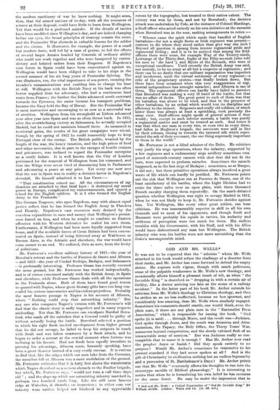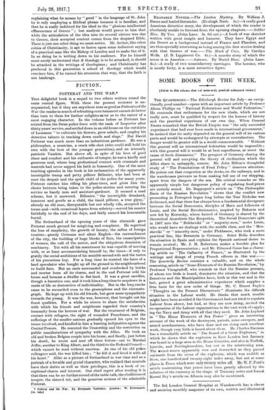COD AND MR- WELLS.° Ix was not to be expected
that the " atheists " whom Mr. Wells attacked in his book would refuse the challenge of a deserter from their ranks, and Mr. Archer has come forward to defend the empty shrine. He exposes with vigour, though with much politeness, some of the palpable weaknesam in Mr. Wells's new theology, and occasionally allows himself a pleasant touch of wit, as when "the Invisible King" is described as " dropping in with a certain air of futility, like a doctor arriving too late at the scene of a railway accident." In the latter part of his book Mr. Archer extends his oriticism from Mr. Wells's theology to Christian theology, and thes he strikes us as no lees ineffectual, because no less ignorant, and considerably less amusing, than Mr. Walls when similarly engaged. Sometimes his comments should startle, one would think, even the plain man, if there aro any plain men in the " Rationalist Press Association," which is responsible for issuing the book. " God spoke (it is said) ... through Moses, and the result was—Judaism God spoke through Jesus, and the result was Arianism and Atha. nasianism, the Papacy, the Holy Office, the Thirty Years' War, massacres beyond computation, and the slowly calcined flesh of an innumerable army of martyrs." But was Judaism really as con- temptible that to name it is enough 1 Hits Mr. Archer ever read the prophet Amos or Isaiah ? Did they speak entirely to no purpose? Would Mr. Archer's conscience be responsive to his present standard if they had never spoken at all ? And is the gift of Christianity to civilization nothing but an endless logonmehy and is procession of St. Bartholomew's Days Mr. Archer points out that Mr. Welle " censtantly allows his thoughts to run into the stereotype moulds of 13ffilioal phraseology." It is interesting to notice that when he is formulating his own belief he has recourse In the same fount. He may be under the impression that in
• Ood and Mr. tlsitm a Critical Examination of !. incirittio Kim:* Be wan.= Aicku. Londuu Watts sad Co. Os. ad. sos.j explaining what he means by " good " in the language of St. John he is only employing a Biblical phrase because it is familiar, and that he is really indebted for his ideal to the " glorious intellectual efflorescence of Greece " ; but analysis would prove to him that while the articulation of the idea into its several virtues was due to Greece, their accepted content comes from the despised Bible. There is just one other thing we must notice. Mr. Archer, like other critics of Christianity, is apt to fasten upon some indiscreet saying of a practical man like the Bishop of London and to make fun of it. In no doing he is writing down to his audience. For he himself must surely understand that if theology is to be attacked, it should be attacked in the writings of theologians ; and Christianity has produced in this generation a school of theology which would convince him, if he turned his attention that way, that the faith is not bankrupt.



































 Previous page
Previous page